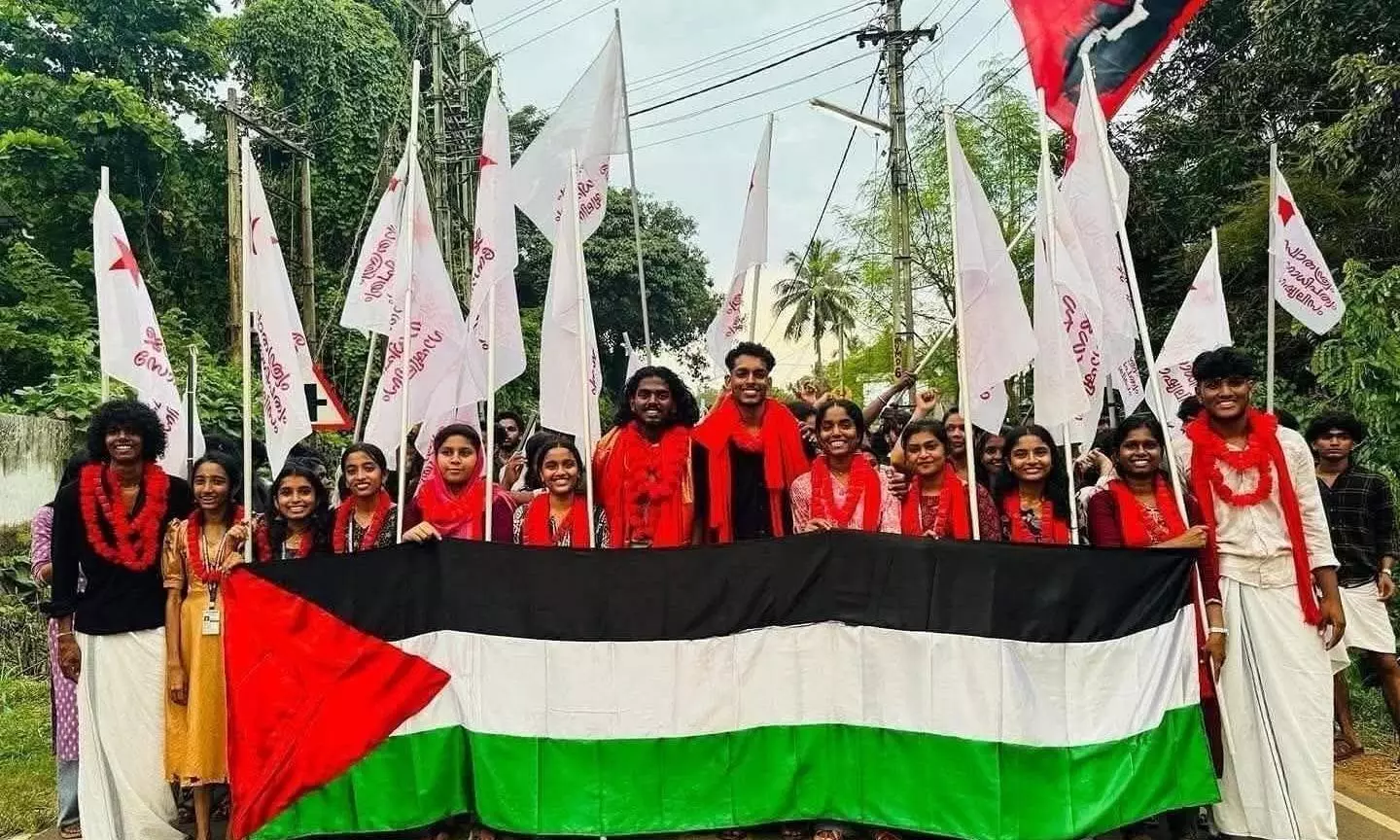
SFI sweeps Kerala campuses, KSU on the wane; MSF makes big inroads
What has worked in favour of the Left, many observers note, is a convergence of local and global political undercurrents

As the dust settles on the university elections across Kerala’s state institutions, the Students’ Federation of India (SFI), the student wing of the ruling CPI(M), emerges as the clear victor.
In campuses across Mahatma Gandhi, Calicut, Kerala, and Kannur universities, SFI’s grip has deepened, while the Kerala Students’ Union (KSU) has struggled to hold ground.
SFI sweeps polls
According to independently collated results, SFI won 65 of the 75 colleges where elections were held under Kerala University, and in 45 of them it was elected unopposed. In Alappuzha district, KSU failed to win a single college union election for the first time.
Interestingly, AISF, the student wing of the CPI, has somewhat become insignificant in the picture.
Across MG University, SFI captured 103 of 123 colleges, with KSU taking 31. In Kannur University, SFI secured victories in 60 out of 77 colleges, including 39 unopposed, while KSU managed only 12.
Also read: Kerala hijab row resolved amicably; student to attend school
SFI wins in KSU, MSF bastions
However, at Calicut University, the state’s largest in terms of number of colleges, spanning Thrissur, Palakkad, Kozhikode, Malappuram and Wayanad, which has traditionally been a stronghold of KSU-MSF (Muslim Students Federation), SFI has regained many of its lost ground.
According to SFI leadership, out of 202 college unions where elections were conducted on political lines, the organisation now controls 127, including 35 wrested from the UDSF alliance (KSU and MSF). KSU secured 21 unions, while MSF claimed around 47. In Malappuram, traditionally an MSF bastion, SFI asserts that it has won 30 out of 73 college unions. The MSF, IUML’s student arm, outperformed KSU in several centres. In fact, KSU, which had expected to be the principal opposition to Left dominance, found itself overtaken even within its own alliance.
MSF outperforms ally KSU
The MSF’s performance complicates the conventional SFI vs KSU narrative. While MSF is an ally of KSU within the UDSF alliance, it outperformed its senior partner in many centres. In certain pockets, MSF activists even celebrated their wins with slogans that pulled at Congress leaders, signalling growing restiveness within the alliance.
Also read: Censor Board's ideological cuts on 'Haal', 'Private' spark censorship fears in Malayalam cinema
These tensions suggest that MSF, perhaps sensing diminishing returns from alignment with KSU, is seeking to carve its own identity and leverage gains independently. For KSU, the embarrassment is twofold: not only failing to check Left dominance but being eclipsed by its own ally.
Upset at Calicut University
At Calicut University, while the SFI claims to have regained control of several college unions, it remains uncertain about securing the university union, where the electorate is made up of student councillors from the affiliated colleges. Last year, the UDSF had wrested the university union, thanks to the councillors from the 200-plus colleges, predominantly from the Malappuram and Kozhikode districts. “As per the initial information, the SFI has secured 252 university union councillors out of a total of 540, which is short of an absolute majority. The stand of councillors from non-political colleges will therefore be crucial,” said PK Khaleemuddin, syndicate member and CPI(M) leader.
“After the Lingdoh Committee recommendations were implemented, there has been no uniformity in how college elections are conducted. Some follow the presidential mode, while others use the parliamentary system, and this inconsistency is now reflected in the university union elections as well,” Khaleemuddin added.
Also read: Why Vembanad's houseboats, a pillar of Kerala tourism, have environmentalists worried
Changing mood at campuses
While the pro-Left mood across Kerala campuses this year spells trouble for Congress and KSU, the resurgence of the MSF, along with the growing influence of identity-based student formations such as the Fraternity Movement backed by Jamaat-e-Islami, is steadily altering the political chemistry of campuses, particularly under Calicut University. These groups have expanded their base among minority and socially aware student segments, often mobilising on issues of representation, inclusion, and rights-based politics.
What worked in Left’s favour?
What has worked in favour of the Left, many observers note, is a convergence of local and global political undercurrents. The assertive posture of Governor Rajendra Arlekar as the chancellor of universities, seen as pushing a Hindutva ideological line, and the interventions of Kerala University Vice Chancellor Dr Mohanan Kunnummal, accused of leaning towards the right, have triggered a visible backlash among progressive student circles. Controversies such as the “Bharat Mata” row and the growing sense of administrative overreach from Raj Bhavan have only reinforced the Left’s narrative of resistance.
Also read: 2026 polls: Are voter rights under threat? | Kerala’s big stand against SIR
The global political climate, especially the renewed wave of pro-Palestine solidarity following the escalation in Gaza, seems to have influenced student sentiments, making them draw parallels between right-wing aggression in India and the fight against oppression in Gaza.
ABVP fails to make an impact
KSU, on the other hand, faces serious introspection. The organisation must rebuild not just resources and cadre networks, but credibility and messaging. Allegations of SFI interference or election manipulation will likely be litigated or publicised, but unless KSU can reclaim ground in colleges, the story remains of decline.
The Akhil Bharatiya Vidyarthi Parishad (ABVP), the RSS-affiliated student outfit, once again failed to make a meaningful impact in Kerala’s university elections. Its presence remained marginal across most campuses, with only isolated wins in a few colleges. Even in institutions where the right had attempted to assert itself — such as Vivekananda College, Kunnamkulam under Calicut University and NSS College, Pandalam — ABVP’s performance was underwhelming. Despite sustained campaigns backed by right-wing organisations and social media mobilisation, the outfit failed to translate ideological visibility into electoral strength.

